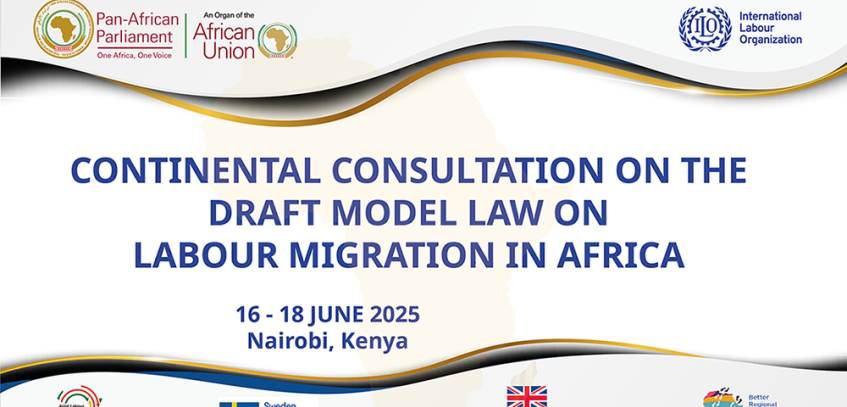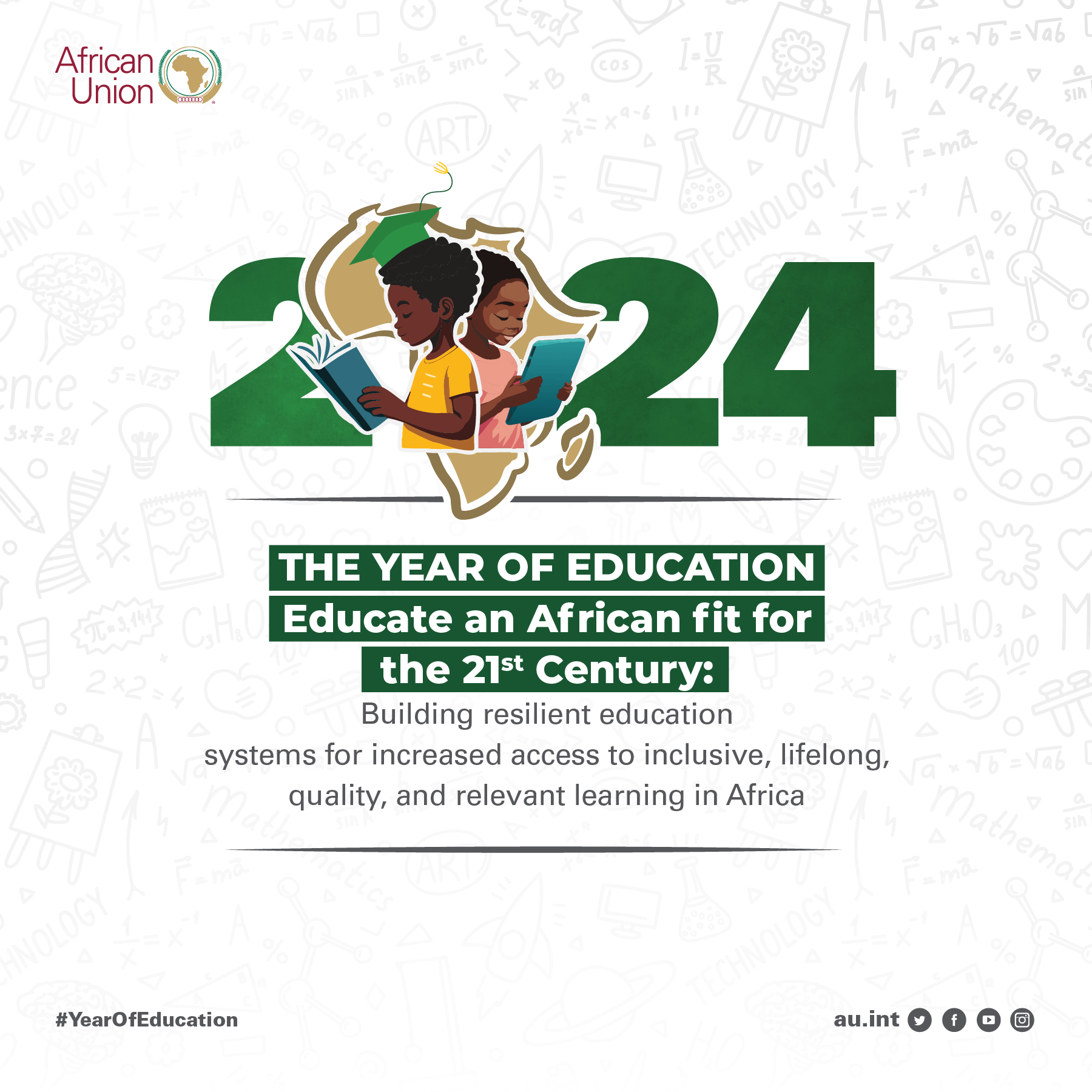NAIROBI, KENYA (16 – 18 JUNE 2025) The Pan-African Parliament (PAP) Committee on Trade, Customs and Immigration Matters (“the Committee”) held a Continental Consultation on the Draft Model Law on Labour Migration in Africa (“the Continental Consultation”) from 16 to 18 June 2025, in Nairobi, Republic of Kenya, under the leadership of Hon. John B. Bideri, Chairperson of the Committee.
The Continental Consultation brought together Members of the Committee; PAP Members from the Kenyan Delegation; Members of the Parliament of Kenya; representatives of the Kenyan Department of Labour; representatives of the African Union Organs, namely the African Union Commission (AUC) Division of Labour, Employment and Migration and the African Commission on Human and Peoples’ Rights (ACHPR); representatives of the United Nations institutions, namely the International Labour Organization (ILO) and the International Organisation for Migration (IOM); representatives of the Regional Economic Communities, as well as delegates from Business and Employers’ Organisations, Trade Unions, and experts from Civil Society and Academia.
The Continental Consultation aimed to receive and consider contributions of the various stakeholders of the draft Model Law on Labour Migration in Africa (the Draft Model Law), and ensure that the Model Law reflects the aspirations of African people and organisations.
The opening session featured remarks by Hon. Sen. Danson Mungatana, Kenyan Leader of Delegation to Pan-African Parliament; Mr Wonesai Sithole, Regional Sustainable Development Specialist, International Organisation for Migration; H.E. Ambassador Hans Henric Lundquist, Permanent Representative to African Union, IGAD and UNECA, Ambassador to Ethiopia and Djibouti; Mr. Khumbula Ndaba, Director of the International Labour Organisation (ILO) Country Office for Ethiopia, Djibouti, Somalia, Sudan and South Sudan, and Special Representative to the AU and the UNECA; Hon. John B. Bideri, Chairperson of the PAP Committee on Trade, Customs and Immigration Matters.
Danson Mungatana, speaking as Leader of the Kenyan Delegation to the PAP, welcomed all participants and expressed the unwavering support and solidarity of the Kenyan Parliament for the process of developing the Model Law on Labour Migration, which will provide national legislatures with a practical tool for alignment with international and continental legal and policy frameworks. He also emphasized the need to protect migrant workers, and to harness the benefits of labour migration, by developing robust laws and policies that protect and safeguard the dignity of migrant workers. He further stressed the importance of properly managed labour migration particularly in enhancing socio-economic development, noting that through remittances, knowledge transfer and skills-sharing, both migrants and their families benefit from increased incomes. The Model Law is therefore, important as a toolkit to reinforce national systems to manage migration in a way that protects the rights and dignity of migrants.
Mr Wonesai Sithole, speaking on behalf of the International Organisation for Migration, emphasized the importance of the draft model law to address the challenges to labour migration governance. He emphasized the need for a Model Law, which is Afrocentric and inclusive, and called on parliamentarians to be well acquainted with it as they have a crucial role to play given their oversight mandate. He further stated that Africa’s youthful population continues to grow – as such, the model law provides an opportunity to build consensus around a framework that takes into account this demographic dividend.
In his remarks, H.E. Ambassador Hans Henric Lundquist, Permanent Representative to the African Union, IGAD and UNECA, Ambassador to UNECA, Ambassador to Ethiopia and Djibouti, Embassy of Sweden in Ethiopia, in his remarks emphasized that when properly governed, labour migration contributes to the socio-economic development of countries of origin, transit and destination. By promoting legal and policy coherence, the draft model law can therefore help reduce poverty and inequality, particularly as it strongly resonates with commitments made to Agenda 2030, and the African Union’s Agenda 2063.
In his keynote address, Mr Khumbula Ndaba, Director of the International Labour Organization (ILO) Country Office for Ethiopia, Djibouti, Somalia, Sudan and South Sudan, and Special Representative of the African Union and the UNECA, bemoaned the fact that despite their contributions, migrant workers face numerous challenges. Therefore, the collective responsibility of all stakeholders is to ensure that migration is handled in a coherent manner in order to safeguard the rights of migrant workers. It is important to double efforts to advocate for the ratification, domestication and implementation of international labour standards and relevant labour migration-related instruments, such as the AfCFTA and other regional and international labour and human rights.
In his opening speech, Hon. John B. Bideri, Chairperson of the PAP Committee on Trade, Customs and Immigration Matters, highlighted the fact that the consultation on the draft Model Law comes at a pivotal moment when the world is facing increasing numbers of migrants, with, a significant share from within Africa. This phenomenon forces workers, especially young people to look for work outside their countries of origin, exposing them to various kinds of risks. He emphasized that effective governance of labour migration is fundamental for ensuring the stability and development of a country – It is therefore the collective duty of all stakeholders to ensure that labour mobility across Africa’s borders is not only economically productive, but also rights-based, gender-responsive, and safely governed.
The Continental Consultation started by exploring and understanding the challenges, opportunities and perspectives to improving labour migration legislation and governance in Africa. The participants highlighted that the legislative frameworks should ensure fair and ethical recruitment practices, protection of migrant workers' rights. They should also ensure effective governance of migration flows and integration of migrants into destination countries, non-discrimination and equality of treatment, and access to social protection systems by migrant workers can go a long way to address the current plight of migrant workers on the continent.
Following expert presentations and extensive deliberations on the draft Model Law, the Participants to the Continental Consultation:
Thoroughly reviewed and improved the structure, content and provisions of the draft of the Model Law to ensure that it is clear, practical and applicable across diverse legal contexts within AU Member States;
Appreciated the progressive, rights-based and gender responsiveness of the Model Law and its relevance in addressing the labour migration challenges in the African context;
Refined the draft Model Law based on expert insights and the latest legal and policy developments at the international, regional and national levels;
Submitted comments and recommendations for integration in the Model Law to ensure it is comprehensive, adaptable and usable across various African contexts (Refer to the Report of the Continental Consultation;
Explored and examined the potential opportunities and barriers to the effective use of the Model Law at the national, regional and continental levels of laws and policies;
Formulated proposals on the role of various stakeholders in promoting the use of the Model Law by African Union Member States;
Strengthened their collaboration and mobilised themselves to support and advance domestic use of the Model Law.
The Continental Consultation also enabled participants to gain a clear appreciation of the subsequent steps in the finalisation of the draft Model Law, which will culminate into its consideration and adoption in the PAP Plenary. Subsequently, the Model Law will be submitted to the African Union Executive Council and recommended for use by the Member States, through Regional and National Parliaments, with support from Governments, international institutions, social partners, Civil Society, academia and other technical and relevant stakeholders.
In closing the Continental Consultation, the Chairperson of the PAP Committee on Trade, Customs and Immigration Matters commended all participating institutions and experts for their robust engagement and pertinent contributions. He also expressed hope for their continued engagement with the subsequent stages of the finalisation, popularisation and advocacy for domestication of the Model Law in the Member States.
The participating institutions and experts expressed deep appreciation to the PAP, the ILO and development partners for engaging with African citizens, organisations and experts in this important exercise. They also pledged their commitment and availability to participate in future activities aimed at ensuring the promotion of the Model Law on Labour Migration in Africa.
The Pan-African Parliament and all participants expressed profound gratitude to the Government, Parliament and people of the Republic of Kenya for the hospitality, which allowed the successful holding of the Continental Consultation.
Nairobi, Republic of Kenya,
18 June 2025








